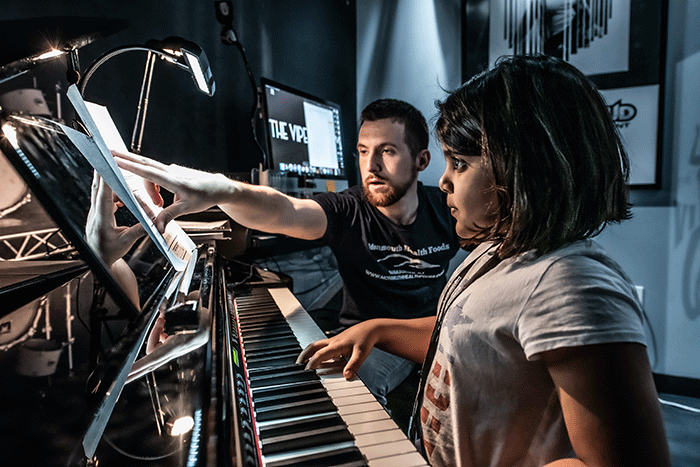Even after all these years, or dare we say centuries, the piano remains one of the most popular instruments. Although it’s mostly associated with classical music, the instrument has found its way into pretty much every musical style today. And we could say the same thing about everyone’s hearts – it seems that everyone loves it! So, today’s article is about beginner piano lessons for kids.
But there’s also the practical aspect of it. First off, there are so many keyboard-based instruments today and piano is the starting point for all of them. And, secondly, the piano is like the fundamental instrument where everything is “laid out.”
With this said, the piano is a pretty popular choice among beginners of all ages. But most notably, it’s fairly common as the first instrument for the youngest beginners. In fact, it’s a great choice even for ages of 5 to 8, which is relatively early compared to some other instruments.
In case your child is showing signs that they want to play the piano, you’re probably wondering “what should I do first to prepare them for it?” Well, that’s exactly what we’re going to talk about here.
Show Them How Exciting the Piano Can Be
One of the first things they should know is how exciting a piano can be. You need to show them that it’s capable of more than just classical music, which can, to be fair, feel a bit uninteresting to them most of the time. Luckily, we live in a time where pretty much all kinds of music are available. Show them some of the more contemporary works where the piano is a prominent instrument.
Get Them Used to Different Styles of Music
Another great way to get them started with the piano, or pretty much any other instrument, is to introduce them to various musical styles. This way, you’ll spark their imagination and, who knows, maybe they’ll find their new favorite genre. Of course, this process may take a while and you should always encourage them to find out about new music on their own.
Show Them That Music Is All About Expression
While we’re at it, it’s important to know that music is an art form. And like one, it’s all about the expression of one’s innermost emotions. Whether you’re playing someone else’s musical piece or whether you’re writing your own original music, it’s all about sending a message of what you’re performing. This goes for pretty much any instrument. But nonetheless, you should let them know that this is also possible with the piano.
Don’t Force Them Too Hard Into It
Although you should always motivate them to keep going forward, no matter how hard it feels, it’s never a good idea to force them into playing an instrument. After all, they have to love music and love the piano. Without that healthy connection between your child and the instrument, there’s hardly any chance they’ll want to play. And forcing them into it rarely ever gives good results.
More on beginner piano lessons below…

Beginner Piano Lessons: Get Them Started With Music They Enjoy
One of the biggest mistakes of traditional music education is that it sticks to the same old songs and musical pieces for many decades now. But music should be mostly about what you love. Sure, there are some standard musical pieces that your child should learn if they want to become great musicians. Knowing how to play their favorite pieces motivates them for sure. That gratifying feeling will keep them pumped for a very long time.
Show Them the Importance of Music Theory
One of the things that beginners of all ages tend to overlook is the importance of music theory. But this is the foundation of every genre. In most cases, it can feel like a boring set of rules that one should follow, and it takes a lot of time to understand some of these concepts. However, find the best way to show them that music theory should be a tool rather than a strict set of rules one should follow.
Show Them the Importance of Metronomes
Yes, using a metronome for practice is probably one of the most tedious tasks for young musicians. But there’s just no other way for a musician to get ahold of timing and groove without using one. Introduce them to metronomes early on, show them how they work, and point out their importance. Your child will thank you later when they become proficient pianists.
Encourage the Use of Modern Technology, It Can Make Things Much More Effective
Luckily, these days we have plenty of learning apps for all instruments. These are available for smartphones, tablets, and all other devices. These aren’t time-wasting video games, but rather actual learning platforms that help young students learn to play new instruments through engaging lessons.
Teach Them About Consistency
No matter the instrument, and no matter what their general interests are, your child should always know that consistency is the key. Although things take time and sometimes might seem like they’re going nowhere, practicing every day gets one closer to their goals.
Patience Is the Key
With that said, it’s also important to know that patience is the key. This goes both for your child and you as a parent. Learning an instrument takes time and you should always be patient. Don’t worry, everyone has their own pace. Practicing, consistency, patience, and, above all, their love for music will do their part. One lesson at a time, one practice session at a time, and they’ll slowly get there. You should just sit back and enjoy it!
If you’re ready to take the next step, check out Rock Out Loud’s piano lessons for kids here!